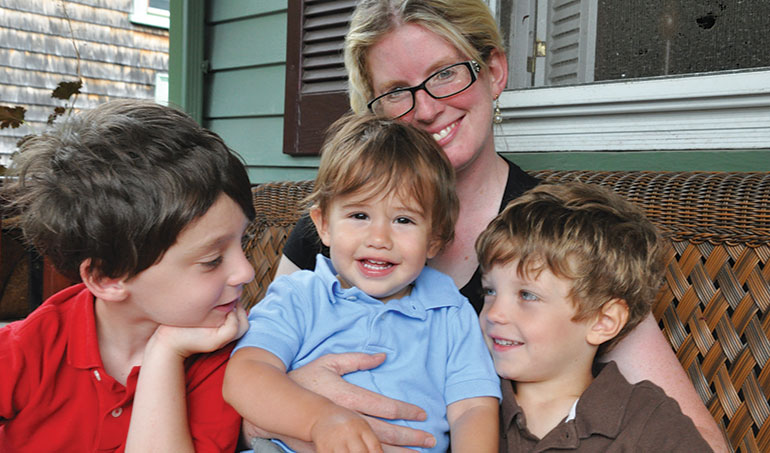If you had asked me to predict the most difficult moment of an appointment with our oldest son’s ear, nose, and throat doctor several months ago, I probably would have guessed that sinking moment any parent dreads — when the doctor dons a serious expression, sighs, and suggests surgery. However, the most affecting memory of that day was less medical in nature. Two women in the waiting room were chatting loudly, when one blithely uttered an anti-Mexican sentiment. The other woman chuckled, amused by her friend’s choice of words, and they went on with their conversation. For me, though, time stopped as I looked at my youngest son, sitting on my lap, who is half-Mexican. My beautiful seven-month-old couldn’t understand the implications of what had just been said, of course, but that will not always be the case.
In the vernacular of adoption, our family is not a “conspicuous” one. We’ve been through the domestic adoption process three times now. Each time, we indicated that we were open to parenting a child of a race other than our own. But the first two times, we brought home boys who not only are of the same ethnicity as my husband and I, but, as some are wont to point out, have similar physical characteristics, as well. When we were matched with the birth mother of our third son, we learned that his birth father is Mexican. Suddenly, we became one of many multiracial families. Still, we don’t immediately present as one to the average passerby at first (or second or third) glance.
When to Address Offenses?
I’m still sorting out my responsibilities as a parent to my youngest child. With our two older sons, we shared the fact of their adoptions with others — liberally, with great pride — though, always by choice as to when and with whom. But now that we’re a multiracial family, must other issues be addressed — even if that means raising them ourselves?
Most people choose not to deliberately offend. We speak in euphemisms if we know someone has recently lost a family member. We don’t make a joke of a mental health issue to someone who is struggling with her own. And no one would want to think they have hurt a child. Yet, many of life’s hurts are inadvertent. It’s impossible to look at a person and see his history, his heart, his mind — and, sometimes, his ethnicity — so people say the wrong thing, often without realizing it.
When an individual’s or a family’s differences don’t announce themselves, comments that would typically be edited by strangers or acquaintances are given free rein. Would the woman in the waiting room have made a pejorative statement about Asian people if the baby on my knee had been Chinese? Would her friend have chuckled at the remark she made if my son’s Mexican ancestry were apparent?
Words and Actions
As my youngest son grows older, it seems the world at large is beginning to notice something about him. Though, it’s interesting to note, race is still not the first thought. This past summer our family vacationed at a theme park. As my youngest son, then one, reclined in his stroller on that hot summer day, a well-meaning older woman walked up to me and asked, “Dear, did you put sun block on your baby? It looks as though he is getting a lot of color!”
I chose to thank the woman for her concern and end the conversation there, but that may not always be the case. My husband and I are going to have to model appropriate responses to offensive comments — intended or otherwise — to arm our son with the tools he’ll need to negotiate his world. Because the casual observer — at the store, in a locker room, on the playground — may not discern that our son is half-Mexican, he will likely hear offensive comments about his heritage or uninformed opinions about current events that may be connected to his birth father’s country of origin. He may encounter people who are initially respectful to him, but who later reveal racist tendencies when they learn his ethnicity. Society is not going to edit for him, because he looks enough like his parents that it won’t bother to inquire.
Whether this is a blessing or a curse or something else will be up to our son to decide. My husband and I will try to instill pride in our son — for his accomplishments, as well as for his heritage. In our imperfect world, we cannot count on people to consistently speak their best words. But as parents we must — for our words will be the very ones our children will use.



